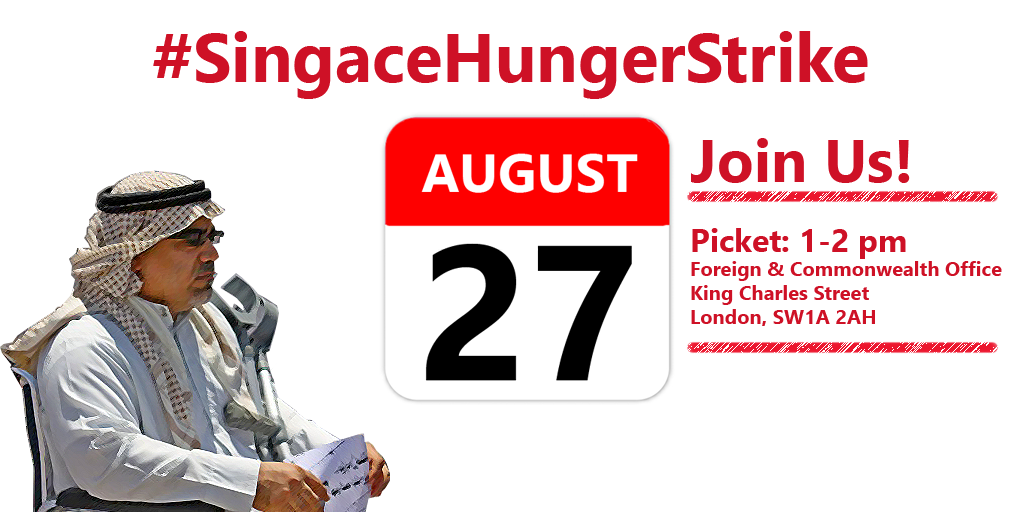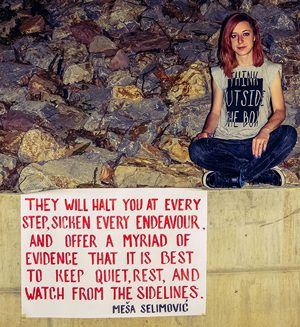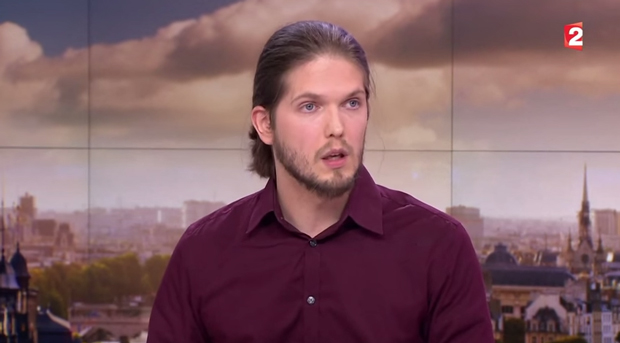26 Aug 2015 | Bahrain, Events, United Kingdom

Dr. Abduljalil Al-Singace is a prominent Bahraini blogger and academic protesting prison conditions in Bahrain. He is currently being held in solitary confinement at Al Qalaa hospital due to his poor health, and is reportedly being denied access to the full medical assistance he requires. Al-Singace, who has been promoting human rights in Bahrain since 2000, is serving a life sentence for allegedly plotting to overthrow the government.
Join us for a picket outside the Foreign and Commonwealth Office on Thursday 27 August to remind the UK that Bahrain does not respect freedom of expression.
When: Thursday 27 August 2014, 1-2pm
Where: Foreign and Commonwealth Office, King Charles Street, London SW1A 2AH
25 Aug 2015 | Academic Freedom, Magazine, mobile, Nigeria, Student Reading Lists
Nigerian activist Ken Saro-Wiwa was one of the Ogoni nine, hanged in 1995 along with eight others by the Nigerian government for his continued protest against treatment of the Ogoni people. His death caused international outrage and sparked the banning of Nigeria from the Commonwealth of Nations for over three years. Since his trial and execution, Saro-Wiwa has become a pillar of free expression and many of his letters and short stories have been published in Index on Censorship, along with pieces about his life’s work. Most recently his son, Ken Saro-Wiwa Junior, published “A letter from Ken Saro-Wiwa” on the 20th anniversary of his death. This reading list groups together a collection of these works.
Students and academics can browse the Index magazine archive in thousands of university libraries via Sage Journals.
Silence on campus: How a Turkish historian got death threats for writing an exam question by Kaya Genç
Ken Saro-Wiwa articles
Ordeal by Innocence by Adam Newey and Ken Saro-Wiwa
Adam Newey and Ken Saro-Wiwa, November 1995; vol. 24, 6: pp. 164-166
Written while Saro-Wiwa was still on trial, Adam Newey writes about how many believe that he will be found guilty and sentenced to death. This is followed by an extract from a statement that Saro-Wiwa was prevented from reading out in court.
Corpses have grown by Ken Saro-Wiwa
Ken Saro-Wiwa, September 1997; vol. 26, 5: pp. 81-82
Taken from Saro-Wiwa’s collection, Songs in a Time of War
The new beggars by Ken Saro-Wiwa
Ken Saro-Wiwa, November 1996; vol. 25, 6: pp. 79-86
A short story based on Saro-Wiwa’s experience with one of the “new” types of beggars, those who tell touching stories in order to get money
Eyewitness by William Boyd
William Boyd on Ken Saro-Wiwa, December 2010; vol. 39, 4: pp. 93-96
British novelist William Boyd writes about his friendship with Saro-Wiwa and the international attention his cause gained in the 1990s
Letter to My Father by Ken Saro-Wiwa
Ken Saro-Wiwa, November 2005; vol. 34, 4: pp. 24-29
On the tenth anniversary of his father’s murder, Ken Saro-Wiwa Junior recalls events and reflects on what has (and has not) changed
The murderers in our midst by Adewale Maja-Pearce
Adewale Maja-Pearce, January 1996; vol. 25, 1: pp. 57-61
A detailed account of Saro-Wiwa’s execution alongside responses to Nelson Mandela’s call for Nigeria’s suspension from the Commonwealth
When knowledge is not enough by “Editorial”
Editorial, January 1996; vol. 25, 1: pp. 3
A short mention of Saro-Wiwa’s execution, and how publicity and knowledge of the volatility of the conflict was not enough to save the Ogoni nine
Letters- Blaming the victim by Ike Okonta
Ike Okonta, November 1997; vol. 26, 6: pp. 8-10
A letter focusing specifically on the role of Shell in Nigeria
Portrait of a Year by Caroline Moorhead
Caroline Moorhead, March 1996; vol. 25, 2: pp. 188-192
A look at Human Right’s Watch’s “authoritative and impressive” report on violations carried out by Shell in Nigeria
The Ken Saro-Wiwa reading list can be found here
21 Aug 2015 | Bosnia, mobile, News and features, Youth Board
This is the ninth of a series of posts written by members of Index on Censorship’s youth advisory board.
Members of the board were asked to write a blog discussing one free speech issue in their country. The resulting posts exhibit a range of challenges to freedom of expression globally, from UK crackdowns on speakers in universities, to Indian criminal defamation law, to the South African Film Board’s newly published guidelines.

Lejla Becar is a member of the Index youth advisory board. Learn more
In 2005, the chair of Visoko municipality cancelled a concert due to be performed by Skroz, a rock band from Bosnia and Herzegovina. He justified his decision by saying that the concert and the sponsor (a famous beer brand) would be insulting for Muslims and Muslim youth.
These decisions riled up both the organisers of the events and also citizens, both Muslim and non-Muslim. One of the main organisers was Adnan Jašo Jašarspahić, editor of independent radio station Radio Q. He was to face consequences in the years to come due to his decision not to obey the chair and ignore the cancellation of the Skroz concert. It was held 15 days after cancellation.
This was not an isolated event. In 2006 Croatian band Let 3 were not allowed to perform in Travnik, a small municipality in central Bosnia. In 2008, Bosnian group Dubioza Kolektiv were banned from performing in Goražde. In the meantime, the Communications Regulatory Agency (CRA) penalised Bosnian radio station Radio 202 — fining them more than €5,000 — for playing hip-hop music on air. The agency stated it had been offensive.
The situation now? In my town, cultural events for youth are a phenomena. More and more young people are leaving, turning to radical Islam or simply living within an oppressive system without complaint. The people fighting the system were silenced. Ten years of violating the right to freedom of expression took its toll and now the government has succeeded in creating a society that is obedient, ignorant and passive.
Lejla Becar, Bosnia and Herzegovina
Related:
• Anastasia Vladimirova: A ruthless crackdown on independent media
• Simeon Gready: An over-the-top regulation policy
• Ravian Ruys: Without trust, free speech suffers
• Muira McCammon: GiTMO’s linguistic isolation
• Jade Jackman: An act against knowledge and thought
• Harsh Ghildiyal: Defamation is not a crime
• Tom Carter: No-platforming Nigel
• Matthew Brown: Spying on NGOs a step too far
• About the Index on Censorship youth advisory board
• Facebook discussion: no-platforming of speakers at universities
21 Aug 2015 | France, Mapping Media Freedom, mobile, News and features

Lilian Lepère has filed a lawsuit against French media outlets for revealing where he was hiding during a standoff with the Charile Hebdo attackers. (Photo: YouTube / France 2)
Graphic designer Lilian Lepère hid under a sink for eight hours while the Kouachi brothers, Saïd and Chérif, on the run after attacking Charlie Hebdo, occupied the printing house where he worked in Dammartin-in-Goële (in the Seine-et-Marne region). Believing it was empty, the brothers hid in the factory for several hours before being killed by a special operations unit of the French armed forces.
While the designer was hiding, MP Yves Albarello (Les Républicains), during an interview with RMC radio, revealed Lepère was in the building. Television channels TF1 and France 2 repeated the information. The Kouachi brothers, who had smartphones and a radio, could have easily discovered Lepère’s presence.
French newspaper Le Parisien recently revealed that Lepère intends to sue RMC, TF1 and France 2 for revealing that he was hidden during the stand-off with the Kouachis. The newspaper reported that Lepère will contend in the suit that the media outlets put his life in danger. Last Thursday, 13 August, the Paris Public Prosecutor’s department opened an investigation.
This is not the first time French media has come under scrutiny for its treatment of the January attacks.
In February, the country’s broadcasting watchdog Conseil supérieur de l’audiovisuel (CSA) distributed warnings to TV and radio stations, noting that 13 media outlets revealed live on air that a confrontation had begun between the police and the Kouachi brothers. Considering this a “serious failure”, the CSA said that the reporting “could have had dramatic consequences for the hostages of the Hyper Casher in Porte de Vincennes”, where Amedy Coulibaly, an accomplice of the Kouachi brothers, was holding hostages at a supermarket. Coulibaly was demanding that the brothers be released. The CSA also blamed TV channels for revealing that people were hiding during the two hostage crisis that took place on 9 January.
The CSA listed the broadcasters’ failings, reproaching them:
• The broadcasting of images showing the policeman being shot by the terrorists
• The broadcasting of elements allowing the identification of the Kouachi brothers
• The disclosure of the identity of a person suspected to be a terrorist
• The broadcasting of images and information regarding an operation still under way, as hostages were still being held in Dammartin-en-Goële and in the Hyper Casher in Porte de Vincennes
• The announcement that a confrontation with the terrorists was taking place in Dammartin-en-Goële while Amedy Coulibaly was still entrenched in Porte de Vincennes
• The divulging of information regarding people hiding in the places where the terrorists had been entrenched, while the assaults had not yet taken place and the hostages’ lives were therefore still at risk
• The broadcasting of images of the assault in the Hyper Casher store Porte de Vincennes
At the time, TV and radio channels contested the CSA’s decision, writing, in a joint letter entitled “Information under threat” that, “The freedom of the press is a constitutional right. Journalists have a duty to inform with rigour and precision. The CSA blames us for having potentially breached public order or taken the risk to fuel tensions within the population. We dispute this.”
They added: “How is it possible to think that, in 2015, the CSA wishes to reinforce the control on an already regulated French broadcasting media while information circulates without constraint in the written press, on foreign channels, all social media and websites? Aren’t they placing us in a situation of inequality in front of the law?”
In a similar story that took place in March 2015, the six people who hid at the Hyper Casher, where Amedy Coulibaly killed four people, filed a complaint against an unknown person for putting their lives in danger. The complaint was directed at the media and specifically at BFMTV, Patrick Klugman, a lawyer representing the group, told Le Parisien. BFMTV revealed that a woman might of been hiding within the Hyper Casher.
“The disclosure of the presence of these people who were hiding, in the middle of a hostage crisis, is a failing that cannot remain unpunished, and all the more so because we knew that the terrorist was watching the TV channel. An information, even if it is accurate, must not put lives in danger”, Klugman said.
Speaking with Le Nouvel Obs, Christophe Bigot, a lawyer who specialises in media, explained that even if an investigation has been opened, because the story had stirred a lot of emotions at the time, Lilian Lepère’s complaint has little chance to succeed.
“The principle, when it comes to the press, is freedom of expression. It has precise limits determined by law, such as libel or the broadcasting of fake information likely to disrupt public peace. In this case, none of these limits can be pointed out. For the media, several complaints could nonetheless be an occasion to examine how to reconcile immediacy of information and ethics,” Bigot said.
Mapping Media Freedom
Click on the bubbles to view reports or double-click to zoom in on specific regions. The full site can be accessed at https://mappingmediafreedom.org/
|
Related:
• Targeted cartoonists show support for Charlie Hebdo
• Stand up for free speech. Publish Charlie Hebdo’s cartoons
• Don’t let free speech die
• How cartoonists responded to the attack on Charlie Hebdo
This article was posted to indexoncensorship.org on 21 August 2015



